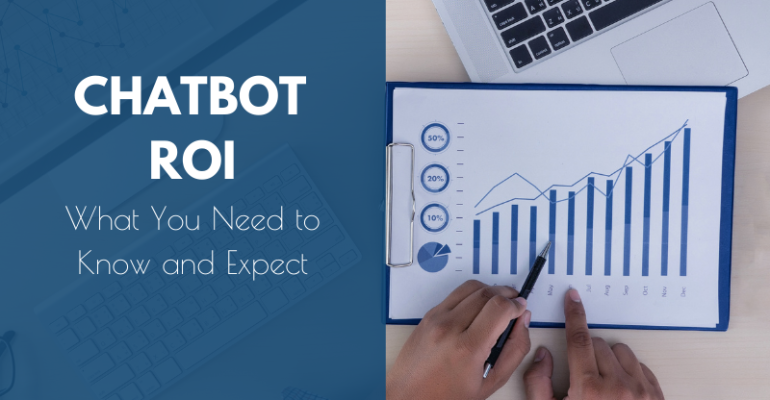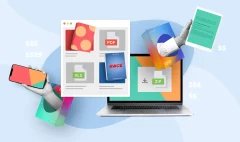Chatbot ROI: What You Need to Know and Expect
Chatbots have become an increasing fixture for businesses in recent years. From offering in-depth customer information to valuable marketing content, chatbots are serving a number of functions on company websites and other owned channels.
But many businesses still want to know if the juice is really worth the squeeze when it comes to chatbots. Is the chatbot ROI they receive going to be worth it?
The answer isn’t a simple yes or no. Chatbots can take on many different forms, levels of AI sophistication, and required maintenance.
To get an accurate assessment of chatbot ROI as a whole, start by examining key use cases and pricing factors. To get the most value out of your chatbot within your budget, you need to know why you’re investing in one and the typical costs for this technology. From there, we’ll help you calculate your chatbot ROI.
Determine Your Need for a Chatbot First
To make your chatbot a more successful investment, it’s important that you have a forward-thinking approach. Have a clear understanding of why you need a chatbot to determine how you should invest in the technology.
Assess how quickly you’ll need the chatbot based on your use case and business’s growth. You might conclude that you don’t need to invest in a chatbot right away, but it’s something you’ll need in six months. Allocate some time to examine different chatbot options to avoid rushed, last-minute research when your business needs the tool.
You’ll also have to decide on the right type of chatbot for your business. Maybe you need a simple customer service chatbot to help alleviate the number of incoming support tickets. Or perhaps you’re looking for a complex marketing chatbot and sales that specializes in customer acquisition.
There’s no wrong answer—it simply depends on the biggest needs you have as a business and how a chatbot might be able to fill those gaps.
What your chatbot can do for you
There are generally two types of chatbots that most businesses use: marketing chatbots and customer service chatbots.
A marketing chatbot is all about helping with customer acquisition and, ultimately, sales. The best and brightest chatbots help prospective and returning customers navigate product offerings, identify what’s right for them, and qualify leads. Marketing chatbots can assist with lead nurturing by helping users find the product information they’re looking for and book demo calls with your sales team.
Starting with a marketing chatbot can be a good way to prove the ROI of the chatbot if you have proper tracking in place to identify when a chatbot is responsible for a customer conversion or assisted conversion.
A customer service chatbot generally answers a handful of common yet simple questions. In many cases, these types of chatbots are built on this-or-that frameworks that only allow you to pick one of a few different preset answers. They include built-in FAQs and customer data to help solve simple requests and take the pressure off of live customer reps who are struggling with bandwidth.
Starting with a customer service chatbot can also be a good way to provide the ROI of the chatbot, although you’ll have to diligently measure how much time the chatbot saves your support team and how that time translates into money saved for your business.
The Cost of Creating Your Chatbot
The amount you invest in a chatbot depends on how you approach chatbot creation. Some companies decide to run their chatbot completely in-house, while others opt to work with a full-service chatbot agency.
It’s also important to note that there’s a wide variety of different cost ranges depending on the framework used and how smart your chatbot is.
In-house development
If you plan on going the in-house route, the primary costs you’ll have will be associated with staff salary. You’ll need a qualified developer with chatbot-building experience. They will have to sit with your marketing or customer service team, or a dedicated conversation designer, to determine all the important pieces the chatbot should include.
There also needs to be a testing period in place before you run the chatbot live. Your in-house chatbot developer will need to spend time tweaking responses and helping staff get familiarized. Also under consideration is the time your developer and conversation designer will spend improving the chatbot over time. The time required for this will depend on how important the chatbot customer experience is to your business, and what capabilities will be added to the chatbot over time.
Agency development
The average cost for chatbot setup at the agency level can run your business between $500 and $2,500. Unfortunately, the monthly maintenance costs can really add up fast at an average of $50 to $5,000 a month. It’s a very wide range, but you can expect to pay on the higher end of that spectrum the more advanced your chatbot is.
Of course, what you’re getting in exchange for the setup and monthly maintenance fees associated with an agency is more peace of mind. The agency takes care of any and all chatbot-related issues, and they share regular chatbot performance reports. You won’t have to worry if something goes wrong with your chatbot, and you dedicate a developer to launching and maintaining a bot.
Since chatbot agencies live and breathe chatbots, they’re well-equipped to handle advanced requests as well. If you want to make your chatbot more complex in terms of natural language processing (NLP), an agency will have the resources to make that happen faster than an in-house employee might.
How to Calculate Your Chatbot ROI
Now that you have your chatbot of choice in place and understand some of the costs associated with it, it’s time to find out if it’s making the money you hoped it would.
Mantra Labs has put together an easy and effective way to calculate chatbot ROI. They approach the calculation from two perspectives: a one-time development cost and a recurring monthly maintenance cost.
Chatbot ROI during the first month (including the bot installation charges):
ROI = (monthly gains through bot – installation charge – monthly maintenance charge)/(installation charge + monthly maintenance charge)
Chatbot ROI after the first month (excluding the bot installation charges):
ROI = (monthly gains through bot – monthly maintenance charge)/(monthly maintenance charge)
To understand all the pieces of the formula, here’s a brief breakdown of what each piece means:
- Gains through bot: The total amount of financial savings you’ve received through your chatbot
- Installation charge: The cost of initial chatbot software and development
- Maintenance charge: Any recurring monthly costs associated with your chatbot
This chatbot ROI calculation can help your business get a better sense of the financial return you’re getting from your chatbot. If you want to get a more holistic perspective of performance, take a deeper look into the individual marketing chatbot and customer service chatbot use cases.
Marketing chatbot ROI
As we mentioned earlier, the primary goal of a marketing chatbot is customer acquisition. In that sense, they serve as a powerful lead generation tool. The most important KPIs you should put in place to measure performance (which impacts chatbot ROI) are leads generated. Track how many chatbot-generated leads eventually make a purchase over a time period and use that as your financial gains.
Drift’s 2020 State of Conversational Marketing report even found that 55% of companies using a conversational marketing solution (like a chatbot) received more high-quality leads as a result. The more high-quality leads your chatbot brings in, the greater your ROI will be, as those individuals are more likely to make a purchase.
Customer service chatbot ROI
To calculate chatbot ROI for customer service, look into how much time your staff would have had to spend answering questions that your chatbot answered. Calculate how long it would take for live reps to resolve issues and complete tasks that your chatbot did over a period of time. Then you can calculate how much that would have cost your company based on salaries. That’s how much you saved in labor costs.
Chatbot ROI Is More Than a Dollar Value
At its core, chatbot ROI is about how much money your business gets back on its investment. But in reality, there are several different factors that make the investment worthwhile but are hard to quantify. To get a better understanding of how conversational marketing can fuel your business.
People also ask:
How do you quantify ROI on chatbot?
- Identify Eligible Queries. …
- Calculate the Percentage of Chats Dealing with Eligible Queries. …
- Calculate Agent Time Spent on Eligible Chats. …
- Estimate the Annual Cost of Handling Eligible Chats. …
- How Does the Chatbot Stack Up?
What do you need to know to make a chatbot?
- Identify your business goals and customer needs.
- Choose a chatbot builder that you can use on your desired channels.
- Design your bot conversation flow by using the right nodes.
- Test your chatbot and collect messages to get more insights.
- Use data and feedback from customers to train your bot.











